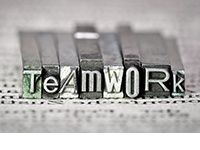
email: robin@rcla.co.uk
Latest news
September Coaching Programme 12/07/2018
Coaching for Results - New June Date 18/04/2018
Social Media Following 16/03/2018
Latest articles
Want your people to trust you? Put your trust in them. 10/05/2018
Fostering the behaviour, and culture, you want at work? 28/03/2018
Communication; think before you...dance? 23/02/2018
Blog
Articles by Month
There is no P in Teams

Teams and Team Working
I find it quite interesting when working with organisations and their teams when I ask them why they have teams – I get the usual there is no ‘I’ in teams and the Together Everyone Achieves More and a splattering of it helps people to work better and enjoy work more. I then ask them what makes a team and I will often hear – ‘being listening to’, ‘having a voice’, ‘sharing ideas’ and supporting each other’. The issue is that those are team working skills that should exist in every workplace, they do not define what a team is or why we have them. In fact, I would argue that a percentage of managers have working groups that try to practice team working skills on a regular basis.
The key to an effective team is surely performance? Yes, we want everyone to achieve more but not necessarily doing more but doing differently! Creating a performance challenge is the key to an effective team. Let’s unpick this a little, as just setting a performance challenge will not make the team (some of you may remember outward courses where you bonded as ‘team’ to overcome a challenge yet the behaviours disappeared as soon as the challenge was removed and forgotten about when back in the workplace.)
So consider three aspects:
Accountability
You need a small group of people, certainly no more than 12, who will hold each other accountable on an individual basis. The lack of accountability produces a comfortable environment with little challenge or urgency – this is hardly conducive to high performance. Accountability is crucial, as is the composition of the team. It is important for people to feel that they have earnt their place in the team, even better if those people self-nominate themselves for a position in the team.
Skills
There are three considerations here: Problem Solving Skills, they need to be able to solve their own problems and to be able to learn the skills of problem solving as a group, the reason you want them as a team is to utilise their brain power, knowledge and experience. Technical / Functional Skills in order to get the job done – it is no good having a team of fitters to do a doctor’s job! Interpersonal Skills – each member needs to be able to manage the relationships with the other members of the team. They should have the necessary skill set to deal with the myriad of challenges that comes with being in a functioning team.
Commitment
This is the key and the area that most team leaders fall down on. The first issue is: What is the common purpose – why are we here? What are we trying to do? One of my previous colleagues always talked about HAGs – Hairy Audacious Goals (I didn’t forget Julian), which set the tone, purpose and pace of the team. We then need to set out a common approach to the challenge and then set specific goals to make the HAG a reality. Failure to set effective specific goals and to hold people accountable creates a performance issue before we have even started working.
Remember there is a difference between team working and being a team, you can’t have a team without team work but team work can exist without a team!




